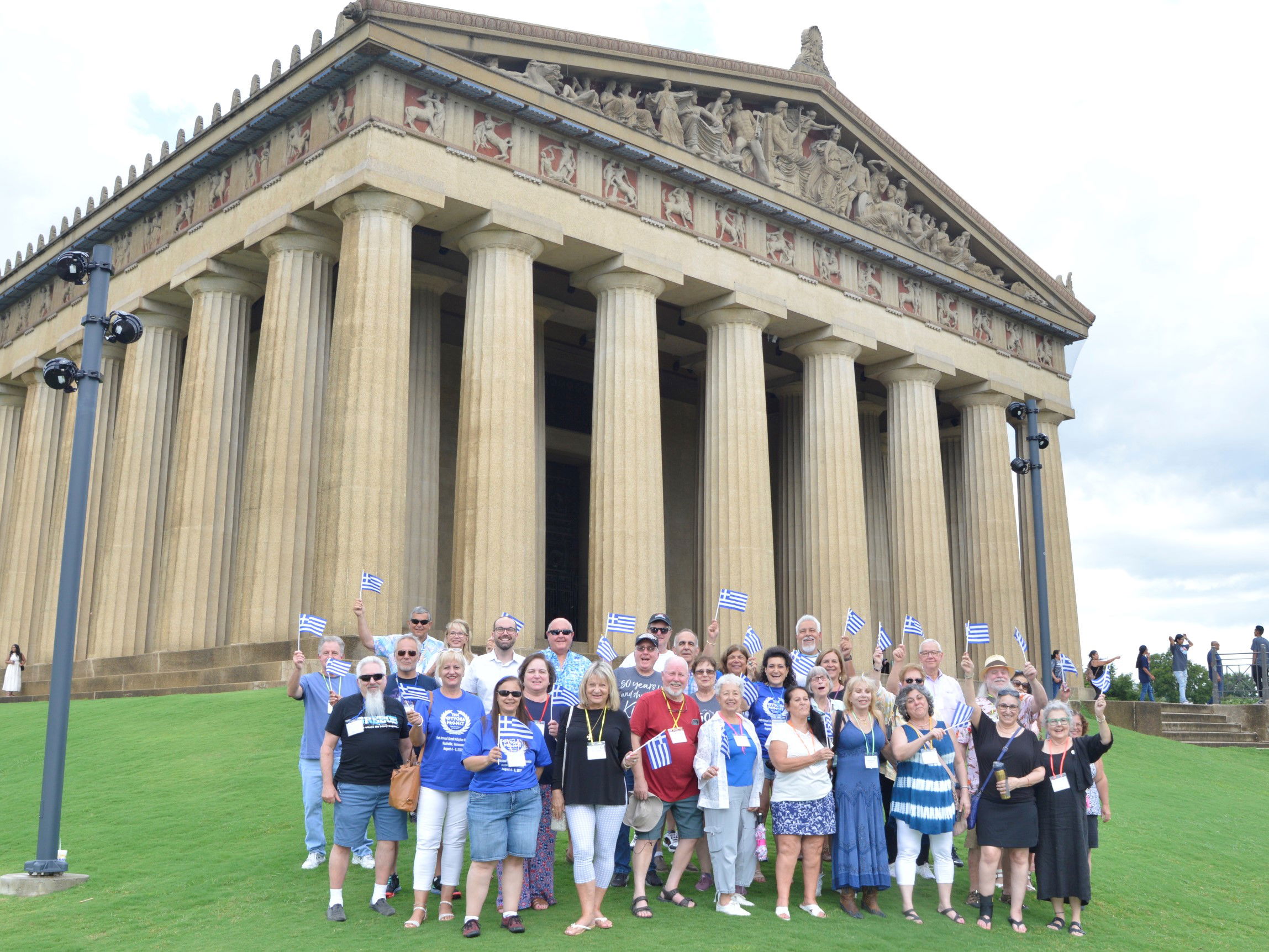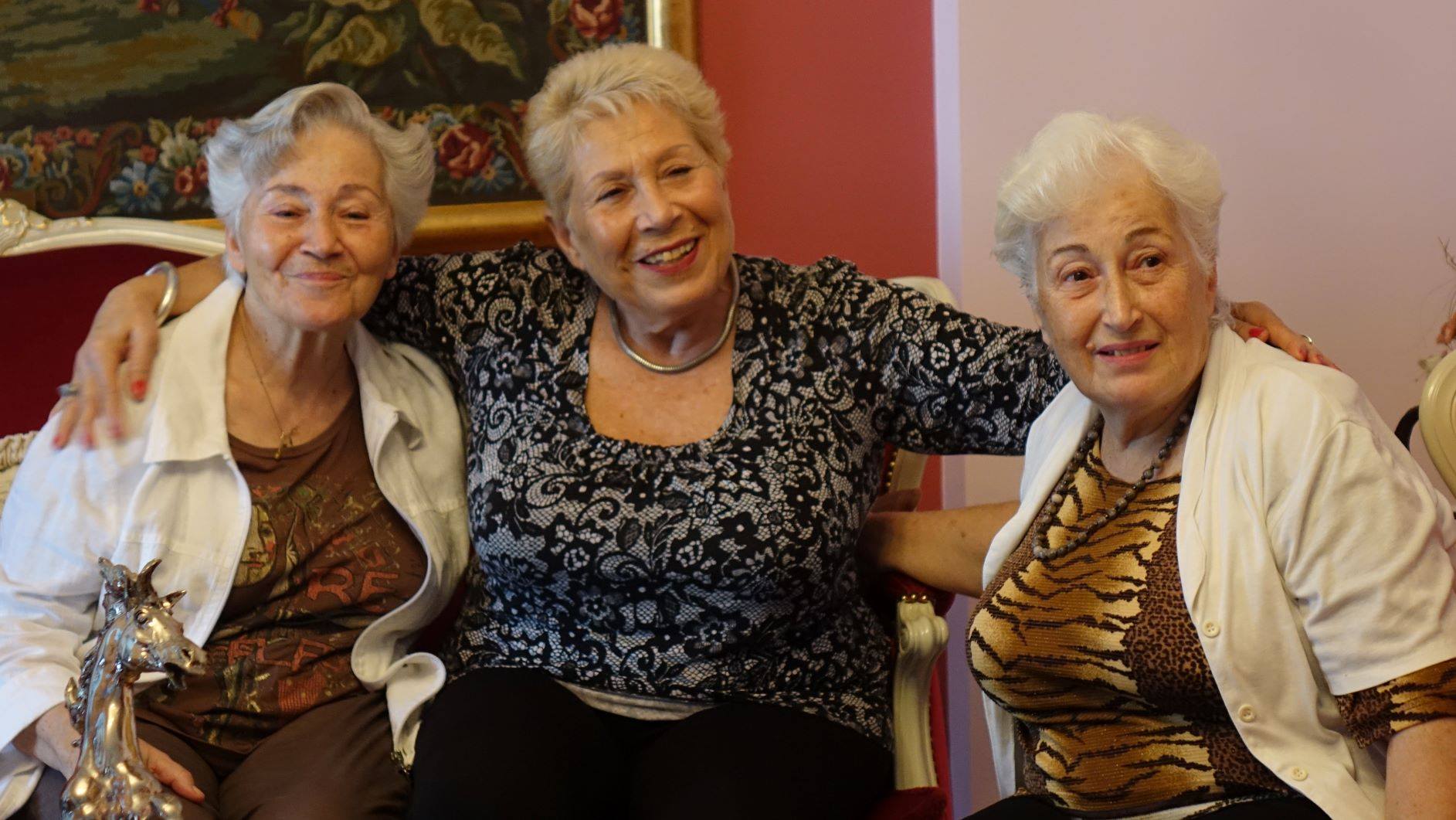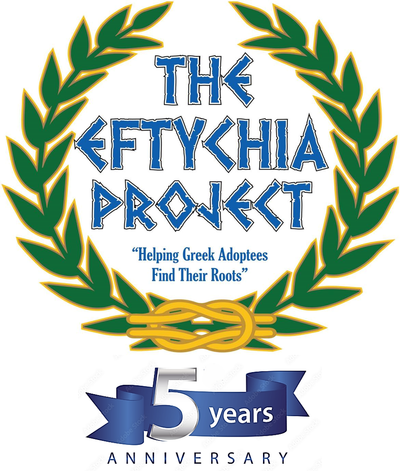ROOTS AND REUNION: A FACILITATOR'S PERSPECTIVE ON LESSONS LEARNED
04/25/2024 by Eftychia/Linda Carol Trotter (c)The Eftychia Project 2024
Doing the work of The Eftychia Project has taught me many things, one of the foremost being that there are kind people in the world who are willing to offer help to complete strangers. It has also taught me that there is no "formula" to searching for a biological family in Greece. Every situation is unique to the adoptee searching for that elusive family connection. The search is shaped by a combination of available documents, people, circumstances, DNA and, quite often, a little bit of luck. But perhaps the most important thing it has taught me is that it is virtually impossible to remain a detached facilitator when working with Greek-born adoptees and Greek biological families.

Greek adoptees pose in front of Parthenon replica in Nashville, Tennessee at the First Annual Greek Adoptee Reunion in August 2022 - photo by The Eftychia Project
Much of our work is conducted through messages on social media or email, and by telphone calls and video chats. To be honest, I prefer video chats, as it is a much more personal experience when one can actually see and talk to the person requesting help in real time. But nothing has brought home to me the very humanity of what we are dealing with than the actual face-to-face meetings with Greek adoptees and Greek families across the USA and Greece.
I was struck by this over last summer, when I traveled across Greece to provide DNA kits to Greek adoptees and families seeking the closure of reuniting with their lost loved ones. Everywhere I went, I was met with open hearts and open arms, welcomed as one of the family, invited to coffee, to lunch, to dinner. As I sat and listened to their stories, their eyes filled with tears of loss -- lost children, lost family, lost years -- my own eyes became misty as they shared with me intimate details of their lives and their quests to find answers.

The Acropolis as seen from the Ancient Agora in Athens - photo by Linda Carol Trotter
The emotional impact was immense. These people, with whom I had corresponded on social media and via email were suddenly in front of me in the flesh. Their stories, once just words on a page, were now verbalized in their own voices, full of hurt and loss, guilt and regret, joy and sadness. Their faces, once just photographs that stared out at me from a computer screen, were suddenly mere inches from mine, faces of living, breathing, feeling human beings, full of life and longing. This was REAL -- and nothing had prepared me for the lasting impact it would have upon me personally.
I had remarked to my husband, when TEP distributed those first 12 DNA kits in Greece, almost three years ago, I'd be happy if even just one of those kits had a close match. Of course, the odds against that happening were astronomical. Thousands upon thousands of people do DNA tests every day. In the grand scheme of things, 12 DNA kits were like a drop of water in a bucket. It would be a miracle if one of the 12 produced a close match, let alone one that would lead an adoptee to their family or a family to their lost child. I knew this in my mind, of course, but still I harbored hope in my heart.
A month later, I received a message from MyHeritage that several adoptees had new matches. As I scrolled down the list, the word "Sister" leapt out at me from my phone. I blinked and looked again. "Sister". We had our miracle! Unbelievably, one kit of those first 12 HAD produced a close match, the closest I had ever encountered. I dissolved into tears as I hastily found the adoptee's phone number to inform her of the life-altering news and prayed I wouldn't give her a heart attack. When she answered the phone and I delivered the happy news, she burst into tears -- and so did I. The next day, she was in touch with the oldest of two sisters, who had lived a mere 80 kilometers (50 miles) away for seven decades.

Pitsa and her sisters, separated for seven decades - photo courtesy of Pitsa
Most may think those of us providing help should be more professional than to become emotionally involved with those to whom we provide help. But how can we not? How can those of us who are also adoptees, especially those of us who have already experienced the joy of finding our biological roots, not feel deeply the emotions of others who are searching? For me, my own journey of finding my biological family in Greece, which is still ongoing, is too new, even almost seven years later. With each case, I feel I am reliving my own quest to find that part of my identity which was lost so many years ago. And when a successful reconnection is made, it is as if I am reliving that moment in my life all over again.
We are, after all, human. We cannot deny or keep at bay the raw emotions that these things stir in us, nor should we. We have lived the same pain, the same joy, the same uncertainty, the same longing. And it creates an unbreakable, unshakeable bond, not only between those of us who seek the most basic of human rights, the right to know where we came from, but also the Greek families who are seeking their lost children.
As adoptees, we want only that which those who aren't adopted take for granted: those ties of blood and bone, of kinship and belonging. For Greek families, many of whom are filled with guilt and regret for circumstances that were largely out of their control, and to whom Greek law gives little or no recourse in their searches, it is a chance for restoration and redemption. One would have to be made of stone not to react on an emotional level when the issues at hand are so emotionally charged and hit so close to home.

Teresa and her biological sister, Angie, meet for first time - photo by Linda Carol Trotter
This is true, even if the discovery of one's biological roots doesn't have the proverbial happy ending. Such cases involve finding that the biological mother has passed away and there are no other close relatives, or the mother still lives but wants no contact with her lost child, or the biological siblings have no interest in contact with the adoptee because they fear the adoptee will try to claim property.
I can imagine the hurt an adoptee must experience in these cases, for I had considered these possibilities in my own search. And while I said I was prepared for any outcome, is any adoptee truly prepared for circumstances such as these? Can they help but feel abandoned and rejected all over again? Or in the case of the mother who has already passed away with no other close relatives, feel that the closure they have longed for their entire lives has been denied forever? Kudos to those of you who can remain stoic in the midst of these tragic circumstances -- I cannot.
As adoptees, we are often so consumed with our own searches that we don't give much thought to how bearing a child out of wedlock in the Cold War era affected the lives of our biological mothers. It's easy to lose sight of the fact that there are two sides to this coin of adoption. We don't know what we don't know. And until you can hear the story of your birth and adoption from those who lived it, it's best to take the stories from your adoptive parents, lawyers and even the orphanage with a grain of salt.
I recently heard a very tragic story of the horrific abuse of an adoptee's biological mother throughout most all of her life, all because she had borne a child out of wedlock. I wept, wondering how many of our biological mothers had endured similar savagery. My own biological mother was banned from the family home and lived outside by the Evinos River for a time, with her brother, Giannis, sneaking out at night to bring her bread so she wouldn't starve. Not only was she stoned by the villagers when she dared approach any of them, but so were the members of her family, because her shame was their shame. And contrary to what was written in my orphanage file, my biological mother didn't abandon me on a doorstep. I was taken from her arms by my own godmother, who then dumped me in an orphanage in Athens and left my mother homeless there for nine months. I sense the memory of that period of her life is still painful, so I have relied on what little information she has volunteered about it and the recollections of family members.

Eftychia/Linda Carol and her biological mother, Harikleia - photo by Barb Lay
In addition to unwed mothers, there are also cases of married women who already had a brood of children and whose husbands died while they were pregnant or shortly after they gave birth. Faced with no resources and no support from the community or the state, they felt they had no other option than to give their babies up to an institution to keep them from starving.
And perhaps nothing was crueler than, for lack of a better term, the dead baby scam. We have heard hundreds of stories over the past almost five years from families all over Greece who were told their babies had either been stillborn or had died a few hours or a few days after birth, and were given neither a birth nor a death certificate. When the grieving parents asked for the body of the dead child, they were told the child had been buried in a mass grave "with the other dead babies", or put into asvesti (lime). In some cases, they were given a sealed box and told not to open it, as the sight was too awful to behold or there would be noxious bacteria released.
I cannot get the image out of my mind of an older couple who asked to do DNA. As I sat across from them at their kitchen table in a small village outside of Chalkida, their hands clasped, they told me the story of their only child, who alledgedly died a few days after birth. So convinced were they that the child still lived, they resorted to asking strangers in super markets if they had been born in 1974. Tears streamed down their faces, their pain as raw and new as if it had happened yesterday and not 48 years before. I admit, I wasn't strong enough to just murmur sympathetically -- I tasted the salt of my own tears as they rolled unheeded down my cheeks.
So you must forgive those of us who cannot remain detached. There is literally no way to prepare oneself for the heart-wrenching stories of these adoptees and their biological families. Just when you think the next story couldn't possibly top the previous one, it invariably does. And one would have to be a cold, marble statue not to feel the agonizing emotions they stir within us.



